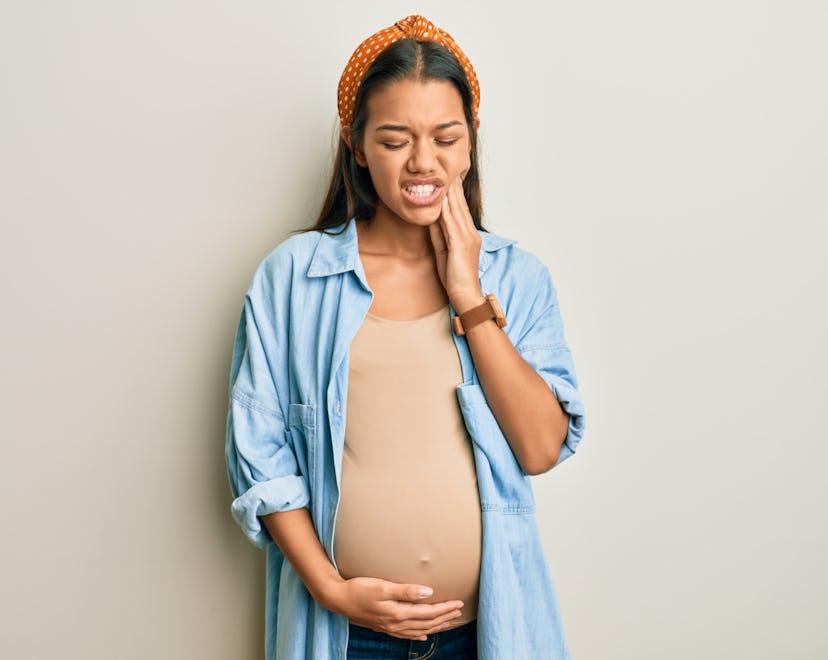Pregnancy

On Top Of Everything Else, Pregnancy Can Also Cause Tooth Decay
Why are your teeth feeling loose and your gums swollen?
Because, hormones.
From swollen feet and aching hips to raging heartburn and shortness of breath, pregnancy can really kick your butt. And as it turns out, carrying a baby in your belly can even damage your teeth, especially if you’ve been experiencing nausea. Here’s why dental issues happen during pregnancy and how you can prevent damage to your pearly whites (and your baby’s).
What Is Pregnancy Tooth Decay?
Pregnancy tooth decay is the increased vulnerability of your teeth to cavities and other dental problems during pregnancy; you may even pass on cavity-causing bacteria to your baby in utero and after birth, according to March of Dimes. So, what do being pregnant and your oral bacteria even have to do with each other?
“Pregnancy increases the risk of tooth decay due to the hormonal changes going on when growing a baby,” says Tina Saw, DDS, a California-based dentist and CEO of Oral Genome, in an interview with Romper. “Being pregnant usually comes with the unpleasant side effects of nausea and morning sickness, along with gagging when brushing teeth. If you’re like most pregnant women, you may also crave sweets, leading to increased risk of tooth decay.”
The combination of a change in your eating habits (hello, midnight refrigerator visits), hormone fluctuations, and avoiding brushing and flossing (hello, pregnancy fatigue) creates a perfect environment for tooth decay to take place, according to the March of Dimes, and even increases your risk of having a premature birth.
What Causes Pregnancy Tooth Decay?
Is pregnancy tooth decay caused by changes in your body, or changes in your diet and habits (like not brushing so far back because you’ll barf in the sink)? It’s a little bit of both, but hormones are at the heart of the problem. Aren’t they always?
“Pregnancy increases the amount of the hormones progesterone and estrogen in your body,” says Saw. “These can temporarily affect your tissues and bones. Many pregnant women will notice redder, swollen, and even bleeding gums when brushing or flossing. This condition is known as pregnancy gingivitis, and it is very common due to hormonal fluctuations. Some women will also notice an overgrowth of tissue or a lump at the gum line. These are called pregnancy tumors and are completely benign.”
And if you’re one of the lucky moms-to-be who suffers from nausea, well, that’s not helping your teeth either.
“The nausea and vomiting from morning sickness can increase the amount of acid in your mouth, breaking down enamel, and cause tooth decay or cavities,” Saw says.
What Should You Do If You Have Pregnancy Tooth Decay?
Saw says that expectant patients should call their dentist if they notice their teeth becoming sensitive, or see small white or brown spots appearing on them, changes in your gums, or your teeth becoming loose. Staying on top of your oral health may even help your baby.
“I always tell my pregnant patients to also make sure that they come in prior to delivery of their baby to get their teeth cleaned to make sure they reduce the number of bacteria in their mouth and also reduce the risk of preterm birth, as studies have shown periodontal infections can increase risk of low-birth-weight babies,” says Saw.
If you’re worried about your teeth now that you’re expecting and want to keep cavities at bay, take some simple steps to protect your teeth:
- Brush your teeth at least twice and floss once daily.
- If you vomit, rinse with water and avoid brushing your teeth until 30 to 45 minutes afterward to prevent brushing acid into your teeth.
- See your dental hygienist for an extra cleaning to reduce bacteria and inflammation in your gums.
- Eat dairy that is low in sugar, like cheese. Casein, the dairy protein, can help reduce your risk for cavities.
- Don’t smoke
Experts:
Tina Saw, DDS, California-based dentist and CEO of Oral Genome
This article was originally published on